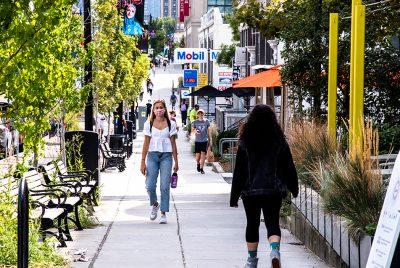
Boston University students living outside of Central Campus are struggling to adjust to a course schedule that includes both in-person and online classes — sometimes back-to-back.
Students who don’t have enough time to return to their dorms for remote classes after in-person ones must find public spaces on campus where they can attend their Zoom class.
John Ivers, a sophomore in the Questrom School of Business, said he has two classes with a 15-minute break in between, but the first is in-person while the other is virtual.
“I’m not going to walk all the way home,” Ivers said. “I’d end up being like 30 minutes late for class if I did that.”
He said that instead, he found an empty lounge on the fifth floor of Questrom and joined the Zoom session. Ivers said he wasn’t sure if BU’s COVID-19 policies allowed him to be in that space, but that he’d rather take the risk than miss his class entirely.
Computer science professor Aaron Stevens said students in his Introduction to Applications Programming class have communicated similar concerns regarding transition times between his in-person class and their other online classes.
“I’m not sure if it’s a major issue,” Stevens said, “or just a small number of students affected.”
Of the 20 students he expected to attend his class in person, Stevens said only seven arrived on the first day.
College of Arts and Sciences sophomore Annabelle Paiva said that after seeing the logistical problems posed by her class schedule — which has several days of in-person and online classes back-to-back — she considered switching her Learn from Anywhere status to entirely remote, but ultimately decided not to.
“I think it’s a lot easier to just do it one way or the other, like completely in-person or completely online,” Paiva said. “I do personally feel that I learn better in a classroom setting rather than on my laptop in my room.”
Paiva, who lives in a West Campus residence, also expressed concerns about finding a space on Central Campus where she will be able to eat, which requires her to take off her mask, while still social distancing and maintaining a WiFi connection that will allow her to access her online classes.
BU spokesperson Colin Riley said students should return to their residences to engage in online classes when possible. For students who are unable to do so in between classes, Riley said that finding outdoor spaces around campus — such as the College of Communication lawn, the BU Beach or other “pocket parks” — where students can sit, social distance and engage in online classes is key.
If the weather bars students from staying outside, Riley said he believes there will be spaces on campus they can find suitable.
“We’re a big school with a long and narrow campus, but millions of square feet,” Riley said. “There may be places that fit your schedule better than someone else’s.”
Riley said that even before the pandemic, students have faced logistical questions regarding class transitions every semester.
“They manage,” Riley said. “First couple of times maybe they didn’t make it on time, but then they figured out [for] that earlier class, they need to sit closer to the door and keep an eye on transportation.”
Transportation across campus, however, may itself pose new challenges after Parking and Transportation Services limited the maximum capacity of the BU Shuttle in accordance with social distancing policies.
The cap for the University’s smaller shuttles is now 20 students, while the larger vehicles can accommodate up to 31 students, according to the Parking and Transportation website. To make up for this decrease in maximum ridership, additional buses will be deployed during peak ridership hours: five additional buses during the morning peak, and three additional buses for the afternoon or evening peak.
David Brinson, a first-year CAS graduate student and teaching fellow, said he will do his best to be understanding toward students who may run into these logistical issues, while also ensuring his class is still learning and engaging with the material.
“I’m trying to be as accommodating as possible, because I really do think of it as students need a professor who’s in their corner, who is looking out for them,” Brinson said. “I don’t want my class to be another burden when there’s so many burdens right now.”





























































































































